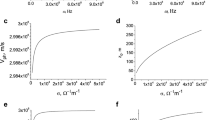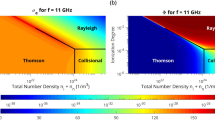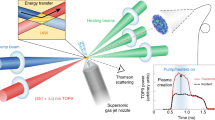Abstract
THE purpose of this communication is to describe experiments performed to determine the angular distribution of the electromagnetic radiation scattered by the positive column of a mercury discharge under the resonant conditions which have been previously investigated1,2. The experiments reported here prove the multiple order of the three largest resonances shown in Fig. 1 to be dipole.
This is a preview of subscription content, access via your institution
Access options
Subscribe to this journal
Receive 51 print issues and online access
$199.00 per year
only $3.90 per issue
Buy this article
- Purchase on Springer Link
- Instant access to full article PDF
Prices may be subject to local taxes which are calculated during checkout
Similar content being viewed by others
References
Romell, D., Nature, 167, 243 (1951).
Dattner, A., Ericsson Technics, No. 2, 309 (1957).
Makinson, R. E. B., and Slade, D. M., Austral. J. Phys., 7, 268 (1954).
Herlofson, N., Ark. f. Fysik, 3, 247 (1951).
Kaiser, T. R., and Closs, R. L., Phil. Mag., 43, 1 (1952).
Author information
Authors and Affiliations
Rights and permissions
About this article
Cite this article
BOLEY, F. Scattering of Microwave Radiation by a Plasma Column. Nature 182, 790–791 (1958). https://doi.org/10.1038/182790b0
Issue Date:
DOI: https://doi.org/10.1038/182790b0
Comments
By submitting a comment you agree to abide by our Terms and Community Guidelines. If you find something abusive or that does not comply with our terms or guidelines please flag it as inappropriate.



